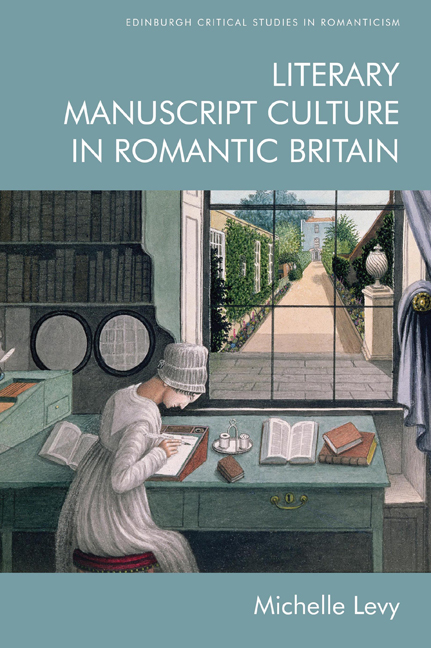Book contents
- Frontmatter
- Contents
- List of Illustrations
- Acknowledgements
- Dedication
- Introduction
- 1 Intentionality and the Romantic Literary Manuscript
- 2 Literary Reviews and the Reception of Manuscript Culture
- 3 Anna Barbauld’s Poetic Career in Script and Print
- 4 Lord Byron, Manuscript Poet
- 5 Jane Austen’s Fiction in Manuscript
- 6 Script’s Afterlives
- Afterword: Blake’s Digitised Printed Script
- References
- Index
- Plate Section
1 - Intentionality and the Romantic Literary Manuscript
Published online by Cambridge University Press: 08 October 2020
- Frontmatter
- Contents
- List of Illustrations
- Acknowledgements
- Dedication
- Introduction
- 1 Intentionality and the Romantic Literary Manuscript
- 2 Literary Reviews and the Reception of Manuscript Culture
- 3 Anna Barbauld’s Poetic Career in Script and Print
- 4 Lord Byron, Manuscript Poet
- 5 Jane Austen’s Fiction in Manuscript
- 6 Script’s Afterlives
- Afterword: Blake’s Digitised Printed Script
- References
- Index
- Plate Section
Summary
Literary manuscripts have always been central to the stories we have told about literary authorship. As witnesses to the processes of creative composition, they have long been used to support theories of original genius. One of the earliest examples may be found in John Heminge and Henrie Condell's address to the reader, in the First Folio of William Shakespeare. There, they contend that Shakespeare, in drafting his plays, never blotted a line: ‘his mind and hand went together: and what he thought, he uttered with that easiness, that we have scarce received from him a blot in his papers’. Almost two hundred years later, in 1807, Isaac Disraeli repeated the analogy, bestowing high praise upon the handwritten manuscripts of Thomas Moore: ‘a specimen of a full mind, not in the habit of correction or alteration; so that he appears to be printing down his thoughts, without a solitary erasure’. The conceit has been applied to many Romantic authors and their manuscripts. Keats's manuscript of ‘Ode to a Nightingale’, showing virtually no cancels or substitutions, has been interpreted in like terms, as a first draft and near final copy, demonstrating the poet's natural genius. Wordsworth is believed to have composed poetry aloud, while walking, later copying his words down from memory. Jane Austen's brother declared that ‘everything came finished from her pen; for on all subjects she had ideas as clear as her expressions were well chosen’.The list of examples could go on.
If an unblotted page signified a clear mind, what might a blotted page imply? This is the question taken up, with comic overstatement, by Charles Lamb (1775–1834) in his magazine essay ‘Oxford in the Vacation’. Here, he recounts his horror upon being presented with the draft manuscript of Milton's poetic masterpiece, ‘Lycidas’:
There is something to me repugnant, at any time, in the written hand. The text never seems determinate. Print settles it. I had thought of the Lycidas as of a full-grown beauty – as springing up with all its parts absolute – till, in evil hour, I was shown the original written copy of it, together with the other minor poems of its author, in the Library of Trinity, kept like some treasure to be proud of.
- Type
- Chapter
- Information
- Literary Manuscript Culture in Romantic Britain , pp. 28 - 63Publisher: Edinburgh University PressPrint publication year: 2020



